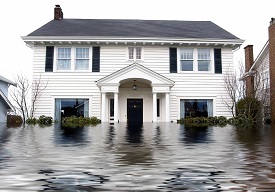 Earlier this year, Houstonians awoke to find most of their city underwater. This month, South Carolina experienced torrential rains that were so severe that—in some areas—the total rainfall exceeded the expected rain totals for a 1 in 1,000 year storm. The World Resources Institute, in collaboration with four Dutch research organizations, estimated that total U.S. property damage from flooding could increase to over $400 billion by 2030. Flood damage will consistently be a serious issue for the insurance industry and one that needs to be constantly evaluated for recovery opportunities.
Earlier this year, Houstonians awoke to find most of their city underwater. This month, South Carolina experienced torrential rains that were so severe that—in some areas—the total rainfall exceeded the expected rain totals for a 1 in 1,000 year storm. The World Resources Institute, in collaboration with four Dutch research organizations, estimated that total U.S. property damage from flooding could increase to over $400 billion by 2030. Flood damage will consistently be a serious issue for the insurance industry and one that needs to be constantly evaluated for recovery opportunities.
It is difficult to recover from the government for damages due to seasonal flooding. Both the Flood Control Act of 1928 (33 U.S.C. 702a et seq.) and common-law discretionary-function doctrine affords the government blanket immunity for flood-control plans. Generally, only a Fifth Amendment Takings-Claim is a viable theory against the federal government for damages caused by flooding. However, tradition dictated that a Fifth Amendment Takings-Claim required a permanent intrusion on private property rights. Thus, property owners had no remedy for the type of temporary flooding that occurs during seasonal flooding.
In 2012, the issue of whether damages caused by temporary flooding could be actionable under the Fifth Amendment was addressed by the United States Supreme Court. See Arkansas Game and Fish Commission v. United States, 133 S.Ct. 511 (2012). In a unanimous decision, the Court held that government-induced flooding of a temporary duration was compensable under the Fifth Amendment. The Court further stated that there was no bright-line rule to determining whether temporary-flooding rose to the level of a compensable taking. However, the Court provided the following guidelines for the lower courts to examine: (1) the duration of flooding; (2) the character of the land and owner’s anticipated use; (3) severity of the interference. Further, the Court held that taking must be an intended consequence of a government action or the recurrence of the flooding be so numerous as to be the reasonably foreseeable result of an authorized government action. (emphasis added)
Recently, the U.S. Court of Federal Claims, applying the rule from Arkansas Game and Fish Commission, found in favor for the plaintiffs in their claims against the government for flood damage after Hurricane Katrina. See St. Bernard Parish Government, et al v. United States, No. 05-1119, (May 1, 2015). The plaintiffs owned property in the Lower Ninth Ward and St. Bernard Parish (districts outside New Orleans) that were damaged by flood water originating from levee failures along the MR-GO waterway. MR-GO was a 71 mile waterway that was built as a short-cut for vessels traveling from the Gulf of Mexico to New Orleans. The Court adopted the plaintiffs’ experts’ opinions that the government’s failure to maintain MR-GO and the unintended destruction of the surrounding wet-lands caused an increased storm surge from Hurricane Katrina. The Court further agreed with the plaintiffs’ experts that MR-GO funneled the storm-surge into the Greater New Orleans-area, which led to the levee failures.
The St. Bernard Parish Government case is important because it indicates an expansion of the “reasonably foreseeable,” standard. The plaintiffs in St. Bernard relied on the government’s negligence in maintaining MR-GO and in the destruction of the protective wetlands to prove causation. Unlike the facts in Arkansas Game and Fish Commission, the government undertook no plan or action that caused flooding in the Lower Ninth Ward and St. Bernard Parish. Further, the trial court limited the importance that the temporary flooding needed to occur on a regular basis or seasonal basis. Plaintiff’s damages were a result of Hurricane Katrina’s flooding, however, the trial court accepted the testimony of lay witnesses that flooding occurred on other occasions in order to satisfy the numerous recurrence factor.
The government advised the trial court that it intended to appeal its decision on liability. Due to the possible government liability – not only for intentionally flooding property, but also if its negligence in maintaining the numerous waterways under its jurisdiction leads to a temporary flooding – this is an important case to track as it moves through the Court of Appeals.





